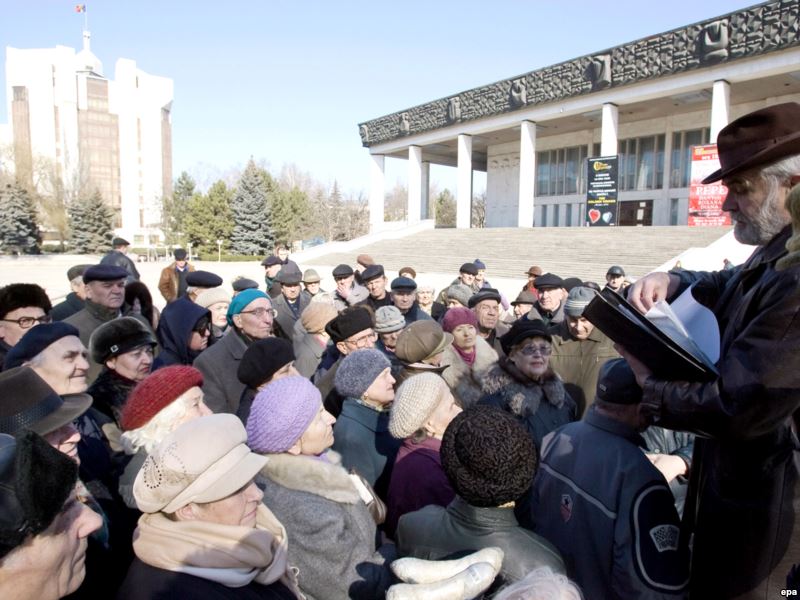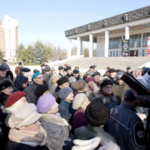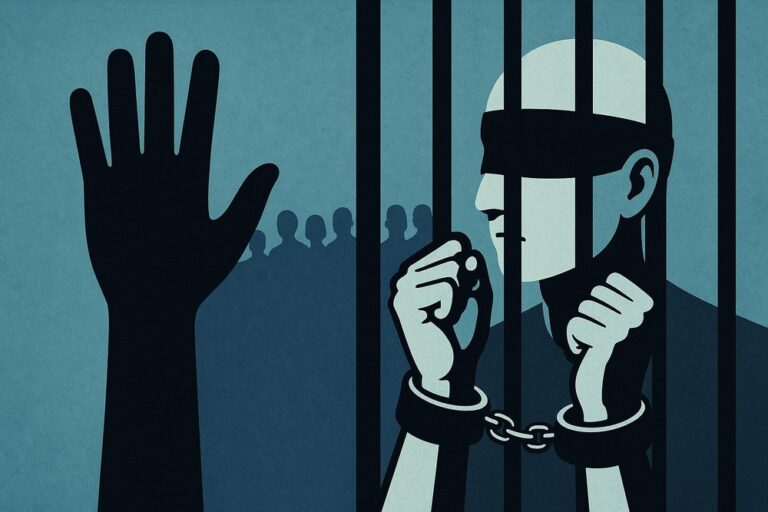AMNESTY INTERNATIONAL PUBLIC STATEMENT
AI Index: EUR 57/004/2011
22 July 2011
Kazakhstan: Authorities urged to protect rights of protesting oil worker s in the south-west of country
Amnesty International has written today to the Kazakhstani authorities to express its concerns over the treatment of protesting oil workers and their representatives in the south-west of the country over the last few months.
Since the beginning of May 2011, thousands of oil industry workers in south-west Kazakhstan have been staging a series of strikes and public protests following disputes around pay and working conditions. The authorities have used excessive force to break up protests and have arrested Akzhanat Aminov, a leading trade union activist, and Natalia Sokolova, a lawyer representing the striking workers. They are currently being held on remand on charges of inciting social discord. Amnesty International considers them to be prisoners of conscience and is calling for their immediate and unconditional release.
Amnesty International is also urging the Kazakhstani authorities to refrain from the excessive use of force in the policing of demonstrations, to investigate reports of past abuses and ensure that international human rights standards are respected in the resolution of the ongoing industrial disputes.
Workers have been striking at Karazhanbasmunai Oil Company, a joint venture between the London-listed Kazmunaigaz and China’s CITIC group, OzenMunaiGaz, another subsidiary of Kazmunaigas, and Ersai Caspian Contractor, part-owned by the Italian ENI oil company.
The workers’ demands have included calls for the authorities and employers to recognise the right of independent trade unions to represent employees and for employers to negotiate through independent unions and not management-approved unions; to reconsider collective agreements so that the interests and rights of workers are based on the principle of equality; to raise salaries and to ensure that salaries and working conditions accord with international labour standards. Hundreds of employees have reportedly been dismissed for their participation in the strikes. Following legal action by the companies, courts have ruled that all the strikes currently underway are illegal.
The companies are arguing that the workers participating in the strike actions are in breach of contract and have stated that they will continue to dismiss employees until the strike actions are discontinued. They also say that no negotiations will be possible while the strikes continue and that employees earn almost twice as much as staff in other industries throughout Kazakhstan. Most of the oil workers are the sole breadwinners for their families.
Salaries in the oil-and-gas-sector in Kazakhstan are amongst the highest in Kazakhstan but workers say that the work is often dangerous, carried out in difficult conditions in remote locations. Living costs tend to be higher than average because most of the essential staples and goods have to be transported over long distances to their settlements. Amnesty International is concerned that some of methods used by the security forces in policing the strike actions have been disproportionate and in breach of national legislation and international obligations and have heightened tensions. The failure of the authorities to investigate violations by the security forces promptly, thoroughly and impartially have added to the grievances of the workers and their families. In June a number of women’s organizations wrote a joint letter to President Nursultan Nazarbaev drawing his attention to the authorities’ failure to investigate a number of complaints about the police insulting, threatening, detaining and beating the wives and other female relatives of striking workers in order to pressure them into stopping the strike actions. The signatories of the open letter warned that this could escalate the situation as the workers felt angry and humiliated by the police abuse and ill-treatment of the women. The incident in question took place on 12 June in the town of Zhanaozen, in Mangistau region. A fight broke out between some of the female relatives who had gone to support the workers at the picket line and women loyal to the company management. Instead of breaking up the fight the police reportedly joined in, grabbing the arms of the female relatives while the other women kicked them. Police officers are alleged to have forcibly dragged nine of the female relatives into a waiting bus and driven them to the district police station, where they continued to beat and humiliate the women. They failed to call for or offer medical assistance when one of the women fell ill and refused to allow an ambulance, called by the woman’s family, access to the police station. Although a medical certificate confirmed that the woman had suffered bodily injuries, including a swollen arm and numerous bruises, the police refused to open an investigation into her complaint of ill-treatment. To date no other investigations have been opened into any of the nine women’s reports. Protestors in the Caspian port town of Aktau have reported how police violently broke up a peaceful demonstration on the square outside the city council offices on 5 June. At least 1,000 oil industry workers, supporters and relatives had gathered noisily but peacefully to bring their demands to the attention of local officials. Anti-riot police officers used batons to beat protesters and disperse the meeting. Four protesters, including independent trade union activist Kuanish Sisenbaev cut open their veins to try to stop the police from using force.
On 8 July dozens of fully equipped special anti-riot police officers reportedly surrounded protesters and hunger strikers at Ozenmunaigaz in Zhanaozen and started removing them by force. The protesters had just sat down to a meal after Friday prayers offered by the town citizens. Some of the police officers threw food dishes to the ground, upended tables and tore down tents. Protesters reported that officers used batons to beat them. Some of the hunger strikers poured petrol over themselves and threatened to set themselves alight if the officers continued to use force.
Leading representatives of the striking workers have also been targeted. On 24 May Natalia Sokolova, a lawyer and trade union activist representing workers in the Karazhanbasmunai Oil Company, was found guilty of organising an unsanctioned mass gathering in Aktau and sentenced to a short period of administrative detention. On the day she was due to be released, she was charged with inciting social discord, under Article 164 of the Criminal Code which carries a potential seven-year prison sentence. She was remanded in custody for two months. An appeal against her detention was turned down. Reportedly, a lawyer willing to work on her case was only found in July. Her husband’s repeated requests to visit her in detention have been rejected. Since her detention, workers have added her release to their list of demands. Independent trade union leader Akzhanat Aminov, who has been representing workers at Ozenmunaigaz was detained by police on the night of 30 June and held incommunicado for several days. He has been remanded in custody for two months also on charges of inciting social discord. The police contend that they have video footage showing Akzhanat Aminov distributing water to strike participants and organising actions. Colleagues of Akzhanat Aminov, however, claim that he did not take part in the strike action. A court in Aktau turned down his appeal against his detention on 5 July. The appeal hearing was reportedly closed to the public and only lawyers were given access to the court-room. His family was not allowed in and his wife is yet to be granted permission to visit him in detention.
Kuanish Sisenbaev, an independent trade union activist at Karazhanbasmunai, was accused of organising an illegal march through the city of Aktau on 5 June. He was released on bail. A court in Aktau sentenced him to 200 hours of community service on 13 July. Nurbek Kushakbaev, the leader of the independent trade union Karakia, which represents workers at Ersai, was detained on 15 June and sentenced that same day to 10 days’ administrative detention and a fine, also for organising an illegal march. The court has also suspended the activities of Karakia.
Amnesty International calls on the Kazakhstani authorities to respect the right to freedom of assembly of striking workers and other protestors and ensure that internationally recognised labour rights are respected in the resolution the ongoing industrial disputes.
The organization urges the Kazakhstani authorities to investigate thoroughly, impartially and without delay all reports of beatings and other ill-treatment of workers and their female relatives by police and to bring the perpetrators to justice in fair proceedings.
The organization urges the authorities to release independent trade union representatives Natalia Sokolova and Akzhanat Aminov. Amnesty InternationaI believes that they are prisoners of conscience detained solely for the legitimate exercise of their rights. They must be granted regular access to their family and legal representatives while in custody.
SOURCE:
Amnesty International
www.amnesty.org/en/library/asset/EUR57/004/2011/en/1c1cb6e6-bfab-459a-bca4-dd07ef84e454/eur570042011en.html








